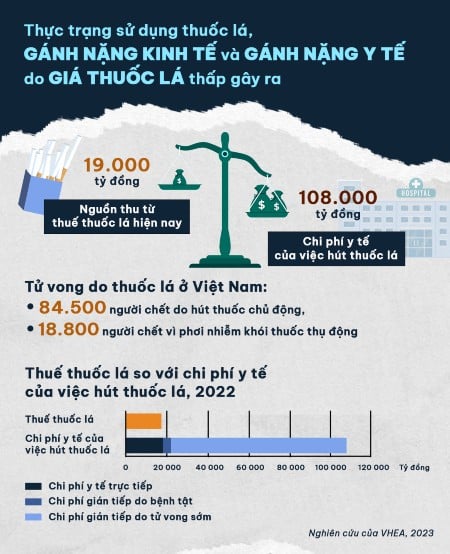Medical costs and economic losses amounted to VND108,000 billion, equivalent to 1.1% of GDP, an alarming figure showing that tobacco is not only a health problem but also a national burden.
Mandatory measures for health protection and sustainable development
In addition to its negative impact on human health, tobacco also causes many serious environmental problems. The tobacco production process consumes a lot of land, water and chemical resources, causing soil degradation and water pollution. Moreover, cigarette butt waste is one of the types of waste that is difficult to decompose and pollutes urban environments, marine and natural areas.
Medical costs and economic losses amounted to VND108,000 billion, equivalent to 1.1% of GDP, an alarming figure showing that tobacco is not only a health problem but also a national burden. |
Imposing high taxes on tobacco reduces demand for production, thereby reducing pressure on natural resources and the environment. This is an important step towards green economic development, protecting the environment and maintaining biodiversity.
Tobacco taxes not only generate large revenues for the state budget but also contribute to the reallocation of resources to essential social activities such as health,education and environmental protection. This revenue can be invested in improving the capacity to prevent and treat tobacco-related diseases, as well as implementing public awareness raising programs.
In addition, reducing smoking rates helps reduce the burden of medical costs and increase labor productivity, thereby promoting stable and sustainable economic development. At the same time, tobacco tax policies also contribute to promoting social equity by protecting vulnerable populations from the harmful effects of tobacco.
Statistics show that although the smoking rate among adult men has decreased slightly from 47.4% to 41.1%, Vietnam is still among the 15 countries with the highest smoking rates in the world and ranks 3rd in the ASEAN region. The obvious reason is the cheap price of cigarettes, due to low tobacco taxes, making this product easily available to consumers, especially young people.
According to WHO, tobacco tax in Vietnam accounts for only 36% of retail price, far below the average of 59% of countries in the same income group and among the lowest in ASEAN. Meanwhile, as people's income increases, tobacco becomes more and more "easy to buy", opening the way for the risk of addiction and unpredictable health consequences.
There is no denying that raising tobacco taxes is the most effective tool to reduce consumption, especially to prevent young people from becoming new victims. Resolution 20-NQ/TW and the National Strategy for Tobacco Harm Prevention have set a clear target: to reduce the rate of male smoking to 36% by 2030. But that target will only remain on paper if tobacco taxes are not raised immediately.
The Ministry of Health supports the plan to increase special consumption tax by combining absolute tax and proportional tax, with the absolute tax starting from 5,000 VND/pack, increasing to 15,000 VND/pack by 2030, aiming to bring the total tax to a minimum of 65% of the retail price, approaching the WHO's recommended level of 70-75%.
Analysis shows that this tax policy will reduce the number of smokers by nearly 700,000 compared to 2020, while increasing tax revenue by VND29,000 billion, an essential resource for reinvestment in public health and sustainable development.
Dr. Angela Pratt, WHO Representative in Vietnam, emphasized that tobacco tax is the “vaccine” that protects the younger generation, preventing them from becoming lifelong victims of tobacco-related diseases. This is not a choice, but a mandatory obligation of the state for the future of the nation.
Economist Dao The Son also affirmed that increasing tobacco tax not only saves people from diseases but is also a strategic financial solution, reduces economic and social losses and boosts labor productivity. Vietnam cannot continue to delay the tax increase, if it does not want to pay the price with the health and development of the whole country.
Need for synchronous policies and drastic actions
Vietnam currently has more than 15 million smokers, facing a huge health and economic burden. More than 100,000 deaths each year due to active smoking and exposure to second-hand smoke, along with medical costs and economic losses of up to VND108,000 billion (equivalent to 1.1% of GDP), are threatening the country's socio-economic development.
Experts agree that increasing tobacco taxes is a “win-win” measure that both protects public health, reduces the burden of disease and death, and increases budget revenue for reinvestment in socio-economic development.
Dr. Nguyen Tuan Lam (WHO Vietnam) emphasized that increasing taxes is the most effective way to reduce tobacco use, especially preventing young people from smoking, contributing to protecting public health and reducing medical costs.
WHO proposes a mixed tax system, adding a specific tax starting at VND5,000/pack in 2026, increasing to VND15,000/pack in 2030, in addition to the current proportional tax. This option would reduce the number of smokers by nearly 700,000 by 2030 compared to 2020, while increasing tax revenue by VND29,000 billion.
According to statistics, Vietnam ranks 15th out of 19 countries in the Western Pacific region in terms of the lowest cigarette prices, with an average of less than 1 USD/pack. The fact that cigarettes are too cheap compared to income makes this product easily accessible, increasing the risk of smoking, especially for young people and vulnerable groups.
According to Ms. Nguyen Thi An, Director of HealthBridge Canada in Vietnam, tax increase is an effective policy tool to protect public health. Besides tax, communication work with thousands of articles, reports, seminars, infographics... has played a key role in raising social awareness about the harmful effects of tobacco.
I think that tax increases cannot be done alone. Communication work must be stepped up to raise social awareness of the harmful effects of tobacco. The press, television and social networks need to work together to convey a strong message about the dangers of tobacco, helping people understand the risks and agree with the policy.
Increasing tobacco taxes is a prerequisite, and cannot be delayed, to save the health of millions of people, reduce the economic burden and promote sustainable development for Vietnam.
This is not only a public health issue but also a strategic financial policy issue. Vietnam needs to act decisively, strongly and immediately to avoid seeing more generations devastated by tobacco. The time to say “no” to tobacco is now.
In the context of more than 100,000 Vietnamese people dying each year from tobacco-related diseases, a number higher than the total number of deaths from HIV/AIDS, tuberculosis and malaria combined, increasing the special consumption tax on tobacco is not only a financial solution, but also an essential action to protect public health and move towards the country's sustainable development.
Source: https://baodautu.vn/tang-thue-thuoc-la-khong-the-tri-hoan-khong-the-chan-chu-d300577.html


































































































Comment (0)